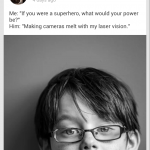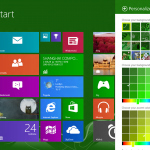Microsoft BUILD 2013: 'If you're going to San Francisco...'

Suddenly San Francisco is the hot developer ticket of the year. Say, can I just rent a room in your house for May and June? Today, Microsoft announced that BUILD 2013 will take place from June 26-28 at the Moscone Center in the city on the bay. Google will be there, same city and venue, with I/O from May 15-17. Apple usually holds its developer conference there in early June but hasn't announced. Big Three trio would be a helluva travel schedule for anyone flying in from anywhere else, particularly outside North America. Choose your event(s) wisely.
I just have to ask: Did Microsoft bump Google? Last year, I/O moved from its more typical May schedule to late June -- 27th-29th. Did Steve Ballmer and Company book early and lock in the dates? I don't really care, and it's not news, but speculation is delicious given the rivalry between these two companies.
T-Mobile USA gets iPhone!

America's fourth-largest carrier finally goes Apple, and you've got to wonder what that means for all the Androids on shelf. T-Mobile USA broke the long-anticipated news this morning, a day after announcing new, unlimited rate plans that ditch subsidies. iPhone comes with 4G LTE roll out in select cities and expanded HSPA+ coverage to the 1900MHz band. Subsidy-free plans, network expansion, iPhone availability and MetroPCS merger are all part of a bold "bet the company" strategy.
T-Mobile will start selling iPhone 5 on April 12, for the lowest upfront-price among major carriers: $99.99. The rest is paid off in monthly payments and for full price of the handset and no contract. Rivals charge $199.99 up front with 24-month contractual commitment and hefty subsidy should customers change carriers before the term expires.
Google+ gives big Android and iOS updates

Google updates just keep on coming. Earlier today new versions of Google+ for Android and iOS pushed out, and I've been too busy to handle the goods (Later! Promise!). Two key areas of focus: Sharing and sharing -- as in primping photos and being better part of Communities. The updates are somewhat different for both platforms.
In an unsurprising move, the iOS app picks up some features from Snapseed, which Google acquired last autumn. So now, when you’re sharing a photo, you can: "Do basic edits like rotate and crop, as well as select filters like Drama and Retrolux; adjust saturation, contrast, brightness and lots more by sliding your fingers up-and-down, then left-and-right; single tap at any time to compare your creation with the original", Amar Gandhi, Google+ director of product management, says.
Windows 8/RT Mail, Calendar, People app updates mean more than you think

"So?" You say. Yesterday, when writing about the Windows Blue leak, I emphasized the importance of Microsoft picking up the pace, by releasing new features faster. Brandon LeBlanc says the updates will come today, but I surely don't see them yet -- so can't authoritatively write about refinements.
Get used to it, these three updates tip changes ahead, like others, such as SkyDrive and Skype. It's a new Microsoft, and the push to the cloud and subscription computing are major reasons, along with competitive need and BYOD. The company's longstanding priority providing backward-compatibility drags development. Some innovations are held back, while enterprise customers using the same software for years keeps new features out of market even if Microsoft releases them. Microsoft lumbers along, in part because core customers do. No longer.
Post-PC era is REAL for U.S. Apple users

Today, comScore started a new service that ranks the top U.S. websites by desktop and mobile views -- the latter is a new measurement. Some of them really pop off the chart, with Apple glaring among traditional companies. More than one-third of unique visitors in February accessed the site via mobile device-only. That compares to 5 percent for Microsoft properties. Analysts, bloggers and journalists often portray the fruit-logo company as best representative of the so-called Post-PC era, and Windows' maker the epoch in decline.
The numbers aren't shocking, if you think about them. Windows has little presence on smartphones or tablets. Microsoft mobile OS smartphones share was just 3 percent during fourth quarter, according to Gartner. IDC forecasts Windows tablet market share, based on unit shipments, will be less than 5 percent this year. By comparison, iOS has greater reach, with, according to the company, cumulative shipments exceeding 500 million. Hell, Apple sold 43.5 million iPhones just in Q4, according to Gartner.
Code Red! Windows Blue leaks

That sure looks like the case, and how timely, too. Microsoft needs a little Windows excitement, given the sorry state of PC shipments and efforts to jump start Surface sales. We haven't seen a good leak like this for awhile, and right now any buzz is beneficial. Even if this thing turns out to be fake, blogs and social shares are worth their weight in gold.
Over at The Verge, Tom Warren offers a great rundown of features. WinBeta provides an intro video and (via Mary Jo Foley tip) there's a Dropbox with screenshots. Briefly, the purported build, 9364, is nothing but -- borrowing from the oft-overused Microsoftie term -- goodness. There is increased emphasis on customization, answering user complaints that Modern UI provides too little, and even hints of Internet Explorer 11. More importantly, everything about Windows Blue suggests an accelerated OS development pace, which significance cannot be understated.
Stop whining about Google Reader

This morning, in a Google+ post, Eli Fennell expressed something I felt for days: That the furor over Google Reader's execution is way, way, way too much. I've written little about the service's demise and actually have argued with colleagues in group chat about their trying to hold onto Reader or mimic the sorely, last-century user interface.
My one quip, from a Thursday story: "You'll never guess what you gave up Google Reader for? The tried-and-true makes way for a few, ah, experiments. Newest: Chrome World Wide Maze". Gasp! Some people took that seriously. I meant it as indictment against all the stupid fuss about the RSS service's July 1 retirement.
Who will buy the BlackBerry Z10?

The question is top of my mind as the smartphone arrives in the United States today from AT&T and next week from T-Mobile and Verizon. Did I miss something, or is this an atypical debut? AT&T usually starts sales on Sundays. This is Friday, right? The phone, which launched January 30, could be yours today for around $200 with two-year contractual commitment.
Way back then I asked: "Will you buy BlackBerry Z10?" The responses aren't as interesting as the lack of them. Less than 700 as I write, which is a surprisingly low number for one of my buying polls and for such a hotly-anticipated device. One-third of you say, yes, by the way, "as soon as available", which for Americans is today. Nearly an equal number of respondents will buy immediately or within three months as won't buy at all -- around 43 percent for each.
I'm puzzled by Chrome World Wide Maze

You'll never guess what you gave up Google Reader for? The tried-and-true makes way for a few, ah, experiments. Newest: Chrome World Wide Maze. Geekdom is abuzz about the oddity this evening. I'm simply baffled, although I see the benefits as a technology preview, which surely must be the point.
Essentially your mobile device running Chrome becomes a remote control for a 3D-maze makeover of any website. I couldn't help myself. I chose bing.com. The setup is a bit convoluted, using -- and therefore showcasing -- tab sync. The process involves opening the site from tabs already available on the other device and completing a handshake using a six-digit number. Then the fun begins, or would have if Chrome Beta for Android hadn't crashed and disconnected while my wife took photos. (Hey, every story needs art.)
Happy Birthday! Twitter turns 7

I've been on Twitter so long, I forgot just how short a time that really is -- or how much has changed since March 21, 2006. The service claims 200 million active users tweeting 400 million times a day. But the real measure is much larger -- how Twitter, and other innovations arriving around the same time, fundamentally changed billions of lives five to seven years later.
The service's editorial director, Karen Wickre, calls Twitter a "global town square", which is appropriate description. People gather to look, listen, gossip, grab news or listen to the town crier. I've often grumbled about the 140-character limitation, but brevity has benefits. Statements are succinct. No one talks on and on and on without interruption. If anything, butting in defines Twitter interaction. You will be heard whether or not anyone wants you to be.
What Eric Schmidt REALLY SAID about the future of Android and Chrome OS

Eight days ago, Google dropped an atomic bomb on the Android Army, with Andy Rubin's sudden departure as commander-in-chief. Sundar Pichai, who is responsible for Chrome and Apps, assumed Android leadership. The change led to much speculation that the operating system would sometime soon merge with Chrome OS. As the fallout spreads, an answer arrives: The question is irrelevant.
Google Executive Chairman Eric Schmidt tells reporters in India that Android and Chrome OS will not merge but converge, says Reuter's Devidutta Tripathy. But there's no quote, just paraphrase, which worries me about context. Fortunately, there is a video that provides context and reveals a different priority: Chrome.
Microsoft pays developers to write Windows apps

What's that ditty about the kid so nasty that when ransomed the kidnappers end up paying the parents to take him back? That kind of describes Microsoft's platform problem -- paying developers $100 per app submitted and accepted for either the Windows 8 or Windows Phone 8 store. Surely Apple and Google don't need to take such a rash approach.
You think I'm going to rake Microsoft, right? Not in the least. This is exactly what the company should do -- jumpstart the ecosystem. With smartphones and tablets choking the life out of PC sales, Android and iOS huge stores of applications, Windows Phone's tiny global market share and Windows 8 marking a major desktop architectural transition, Microsoft must do something. This short-term program is sensible and appropriately timed.
Google Keep -- for notes, memos and ideas best kept in the cloud

Confession: I've never used Evernote, much to the abash of colleague Alan Buckingham (or so he expressed in group chat a little while ago). But I would use Google Keep, which released today. Russell Holly calls Keep "the not-quite Evernote clone" -- for anyone making bold comparisons.
You tell me. Does this sound familiar, Evernote and OneNote users? "With Keep you can quickly jot ideas down when you think of them and even include checklists and photos to keep track of what’s important to you", Katherine Kuan, Google software engineer, says. "Your notes are safely stored in Google Drive and synced to all your devices so you can always have them at hand". She adds: "If it’s more convenient to speak than to type that’s fine -- Keep transcribes voice memos for you automatically. There’s super-fast search to find what you’re looking for and when you’re finished with a note you can archive or delete it".
'Send to Kindle', and read it later

Last night something strange caught my attention, nearly enough to post a late-day story. Then this morning I got a little email nudge from Amazon PR, and thought: "Yeah. Why not?" The timing and broader ecosystem implications are interesting for service "Send to Kindle". Just as Google whacks RSS -- pulling feed icons from its products and setting Reader's execution -- Amazon provides a mechanism for saving content you come across, say, browsing at work for reading at home on your ebook reader or tablet.
The concept is by no means new, not even for Amazon. There are several good cloud services dedicated to saving content for later reading or incorporating the capability. Instapaper comes to mind, and Feedly has an easy tap mechanism to save for later. What makes Send to Kindle different is device/app-specificity. Additionally, websites, including WordPress blogs, can place a button supporting the service.
It's not you, LinkedIn is down -- no up, down, up

When I signed onto group chat this morning, my colleagues bantered about problems accessing LinkedIn. They couldn't. I navigated to the site easily enough, but got this message when trying to log in: "An Error occurred during authorization, please try again later". The social network's Twitter feed confirms there are problems, but information is contradictory.
About two hours ago: "We're aware that the site is currently down, and our team is working on it right now. Stay tuned". An hour later: "The issues you may have experienced with our site earlier have been cleared. Thanks for your patience". But they weren't fixed. At 9:21 am EDT: "Our site is currently experiencing some issues. Our team is continuing their work on this. Stay tuned".
Joe's Bio
Joe Wilcox is BetaNews executive editor. His motto: Change the rules. Joe is a former CNET News staff writer, JupiterResearch senior analyst, and Ziff Davis Enterprise Microsoft Watch editor.
Ethics StatementBetaNews, your source for breaking tech news, reviews, and in-depth reporting since 1998.
© 1998-2025 BetaNews, Inc. All Rights Reserved. About Us - Privacy Policy - Cookie Policy - Sitemap.
